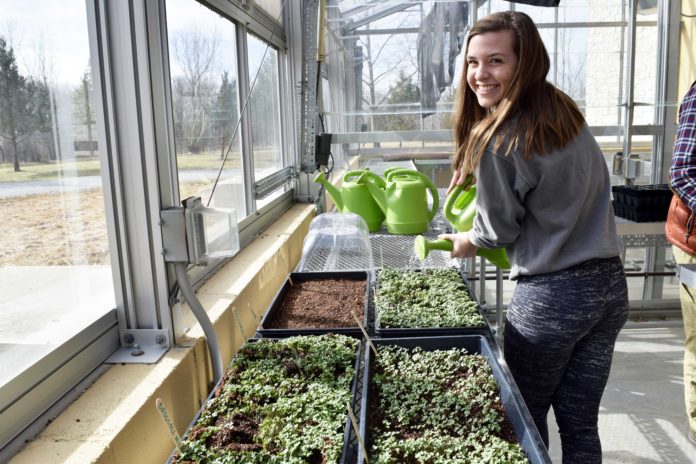
A new campus farm will begin construction this summer, due to a $1 million donation from the Ullem family.
The Ullem Family Campus Farm and Center for Sustainability will be located near the DePauw Nature Park and Blackstock Stadium, providing more accessibility to students than the current campus farm, which is located by the Prindle Institute for Ethics.
Students participating in an on-campus Winter Term course began deconstructing the old farm in January. The new Center for Sustainability is set to begin construction immediately and open next year. As of now, Sustainability Director Anthony Baratta hopes The Ullem Family Campus Farm and Center for Sustainability will be completed by February and ready for a grand opening in the Spring of 2018.
The new campus farm was funded by Scott Ullem, who graduated in 1989, and his wife Beth. “The [Ullem] family just took a lot of pride in trying to make DePauw’s campus farm one of the best, brightest, most sustainable initiatives in the entire Midwest for liberal arts colleges,” said first-year Rachel Moore.
After the Ullem family read a feature on the old campus farm in the alumni magazine, they visited DePauw and decided to provide funding to expand the facility.
The space will be available for students and faculty of all major interdisciplinaries. Baratta said the new space will provide “a classroom teaching space where professors will now have a place to bring their students year-round for a visit to the farm.” Moore hopes the additional space will inspire the creation of co-curricular classes, such as cooking, that can utilize the campus farm.
Along with new rooms for teaching, the expansion of the building will provide additional rooms for washing the produce. With the farm’s extra space and overall expansion, Moore believes the building could lead to even more sustainable opportunities, such as the implementation of solar panels and the creation of a design that nearly eliminates carbon usage.
“Ultimately, the idea of sustainability isn’t just about one place being sustainable. It’s about the entire world becoming a more sustainable place to live in,” Moore said. “It’s not about selfish intentions and only wanting to make it better for yourself. It’s about wanting to make it better for everyone else as a whole.”
Baratta explained that the farm hopes to grow produce year-round in the new building. Right now, the campus farm distributes its food to Bon Appétit and sends leftovers to the Greencastle food pantry. But after the construction of the new building, the goal is to expand outreach to other partners.
As of now, a restaurant is interested in potentially partnering with the farm. “They’re going to be buying directly from us, so we’re going to be taking more food safety courses so we can properly learn how to wash, cut, and prepare the food to ship it out to the restaurant,” Moore said.
Baratta said the main goal of the campus farm is to empower students. He hopes the new space will allow students to gain applied, as well as practical, experience. On a bigger scale, he sees the new building enhancing the wellbeing of the Greencastle community, and even allowing students to participate in solutions to global challenges.
The campus farm has made Moore feel more connected to the Greencastle community in ways that she said would not be possible without the farm.
“It’s a part of campus but it’s also a part of Greencastle, so being able to go out there and be a part of something bigger than just DePauw’s campus has totally changed my perspective and experience in college,” she said.
While the Sustainability Leadership Program, which pairs students with sustainability projects on and near campus, works closely with the farm, the space has impacted students of all activities and majors.
First-year Emma Wittkowski said that, as a vegan, “getting locally grown food from the campus farm has been really helpful and makes it so it’s not super processed.”
Moore hopes the new campus farm will continue impacting students the same way it has impacted her experience here on campus.
“I think a lot of times we segregate DePauw students from Greencastle community members,” she said, “ and the farm is a place where both can come together and work together to make a difference for not only DePauw but also the Greencastle community.”
